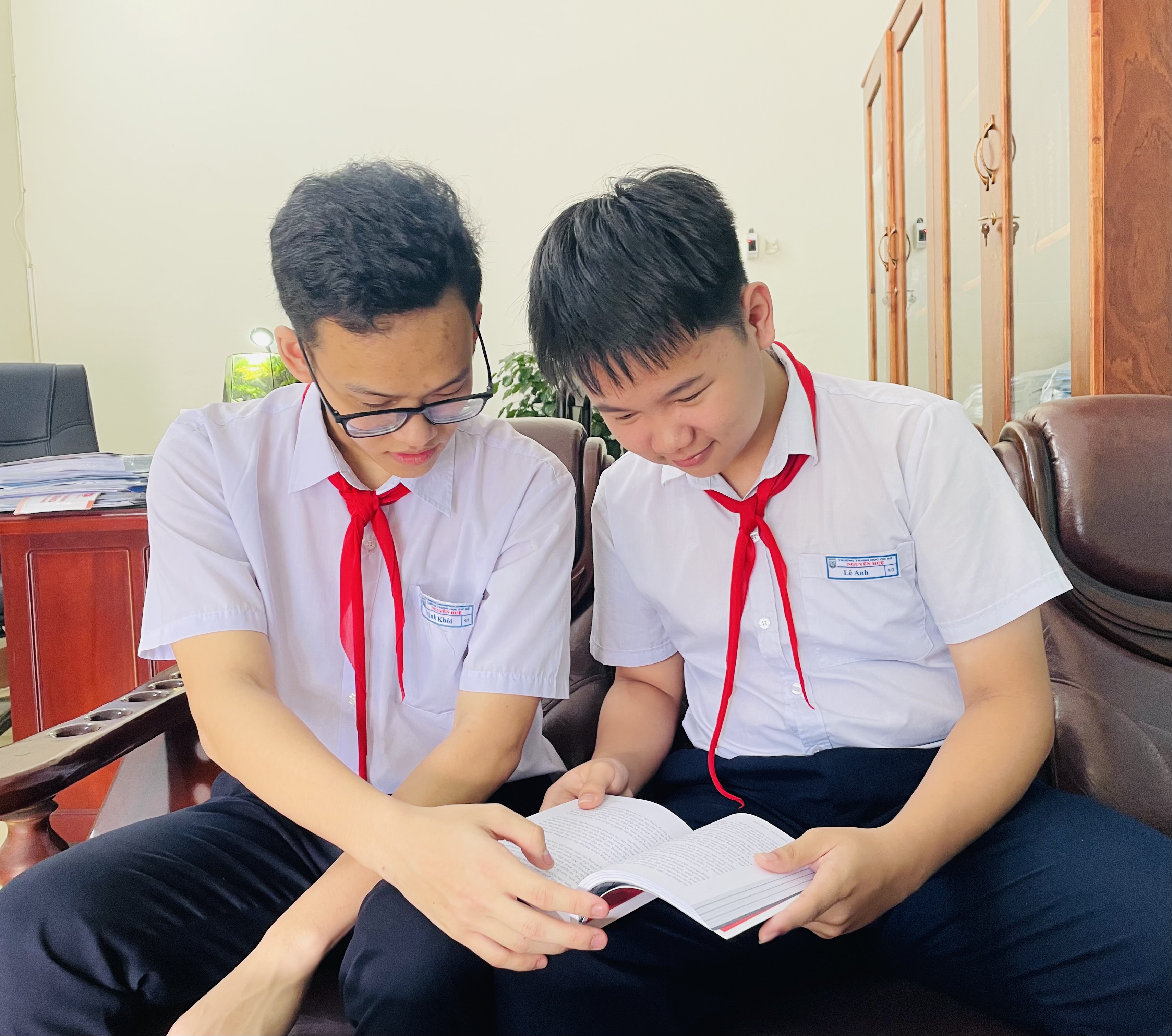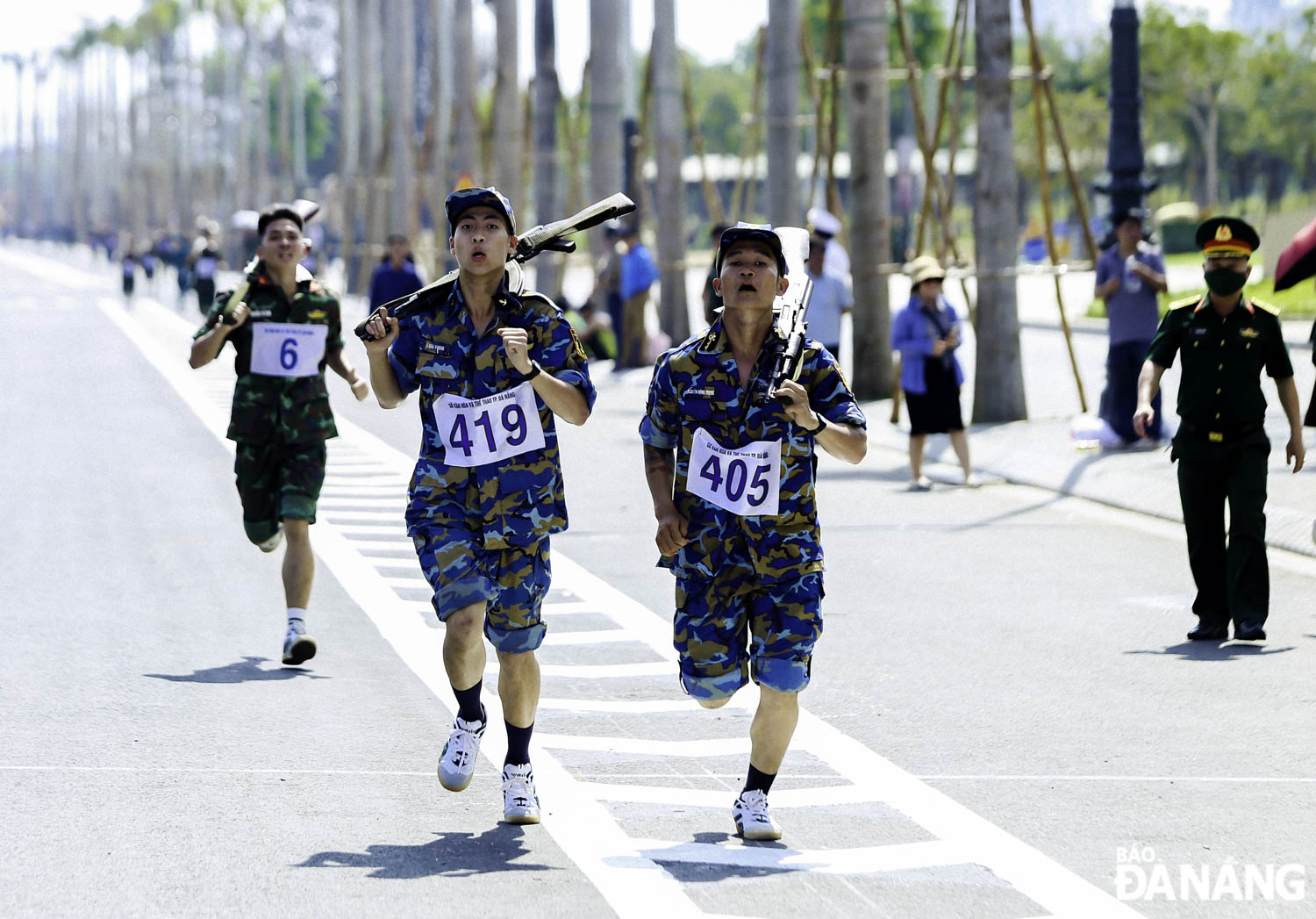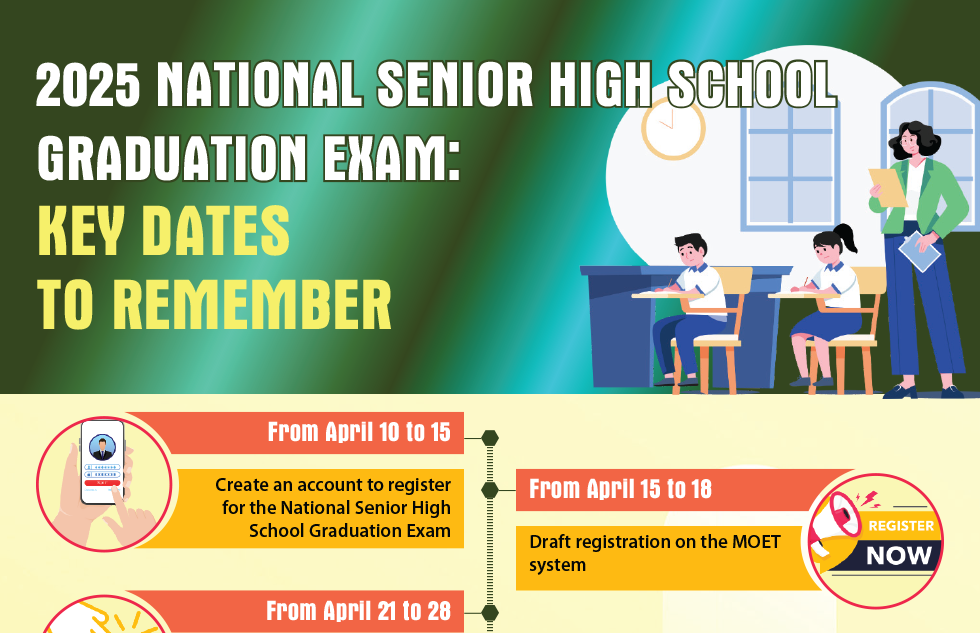A passion for history born from true feelings
History is a subject with many learning approaches, but to truly grasp it effectively, one must engage with both passion and emotion. It is not merely a series of recorded events on paper or narrated accounts—it is a journey of personal experience and genuine feelings that each learner must discover for themselves. At times, it means imagining oneself as part of the story, stepping into the past to empathize, to feel, and to reflect. This emotional connection becomes the driving force that encourages deeper exploration and a more profound understanding of history.
 |
| Le Anh (far right) and his friend Pham Minh Khoi always spend time studying, reading, and exploring historical stories. Photo: T.V. |
Through conversations with various individuals, I found that their passion for history often stemmed from moments of deep emotional connection with a historical figure or event. Once touched by such sentiments, history unfolds before them like a slow-motion film, revealing each chapter in a vivid and compelling way.
1. Nguyen Tuong Vy, a 12th-grade student from Phan Thanh Tai High School, who won first place in the city-level History Olympiad in both 9th and 12th grade, shared that her love for history was sparked in middle school. She was profoundly inspired by the resilience, bravery, and unwavering spirit of politician and diplomat Nguyen Thi Binh, as well as General Nguyen Thi Dinh. Their stories of courage and dedication encouraged her to embrace history as both a passion and a companion.
When reading the famous words of Swedish writer Sara Lidman about Nguyen Thi Binh in the book In the Heart of the World: “Wherever Madame Binh is, no one notices anyone else; when she speaks, no one wants to listen to anyone else…” or Professor Tran Van Giau’s remark about General Nguyen Thi Dinh: “Women like her live as generals and, in death, become legends,” Vy couldn’t help but wonder—what made these two women legendary? That curiosity led her on a journey of exploration, deep study, and realization, uncovering layers of history she had never known before.
Vy deeply admires the image of Nguyen Thi Binh when she signed the Paris Peace Accords in 1973 with a confident, gentle, gentle but extremely steadfast and firm demeanor. She has also been moved time and again by the resilience and courage of General Nguyen Thi Dinh, who endured the pain and loss of a wife and mother yet remained steadfast in her revolutionary work until the very end of her life. The deeper Vy delves into their lives and revolutionary journeys, the more she feels as though she is reaching back into the past, touching history itself. Through this, she respects and shows her gratitude to the generations who dedicated their entire lives to shaping the nation’s present.
Thanks to the powerful images and stories of these two female generals, Vy gradually fell in love with history without even realizing it. Now, history has become an inseparable part of her life and the driving force behind her dream of becoming a teacher—someone who will bring history to life through storytelling in the future.
For Le Anh (Grade 9/2, Nguyen Hue Secondary School), who won first prize in the city-level History competition for ninth graders, his passion for history is deeply tied to the emotions he felt when reading about the life of President Ho Chi Minh. Engraved in his memory is the image of young Nguyen Tat Thanh, at the age of 21, setting out on a journey to find a way to save his homeland. He vividly recalls how, upon returning to Vietnam, President Ho Chi Minh chose Pac Bo (in Cao Bang Province) as his revolutionary base, leading the resistance against the French amid harsh conditions—enduring the biting cold and the unforgiving wilderness. Thinking about that era fills Le Anh with profound emotion, a deep sense of admiration, and an overwhelming compassion for Uncle Ho. It is through these reflections that he truly understands that the peace he enjoys today came at the cost of immeasurable sacrifice and bloodshed by past generations.
2. Lai My Quynh (23 years old, from Da Nang), valedictorian of the Journalism program at the Faculty of Literature, University of Education (University of Da Nang), finds herself overwhelmed with emotion every time she reads the letter pilot Nguyen Gia Thieu sent home, reassuring his family with the words: "If one day I do not return." A courageous airman, he and his beloved MiG-21 became a blazing missile, striking the enemy and contributing to the resounding victory of the battle “Ha Noi – Dien Bien Phu in the air”. It was in those moments of teary-eyed admiration that Quynh found her unwavering love for the history of her homeland.
Among the many stories I have listened to about history, what truly surprised me was Huynh Duc Minh Tho, a fifth-grade student from Nguyen Duc Canh Primary School. Though still young, Tho has spent nearly two years exploring and familiarizing himself with history. Up to now, he has read extensively about President Ho Chi Minh, General Vo Nguyen Giap, and General Secretary Nguyen Phu Trong. Beyond that, he has even delved into the First and Second World Wars. I was astonished by the vast amount of historical knowledge he has absorbed and even more impressed by how fluently, coherently, and seriously he presents what he has learned.
Regarding General Giap, Tho knows that he was once a history teacher before becoming a brilliant military strategist recognized worldwide. He admires and has read extensively about the life of General Secretary Trong, from his early years to his passing. The image of people across the country weeping and paying their deepest respects to him seemed to weigh on Thọ’s bright eyes and clear voice as he spoke with me. I asked him about his dream for the future. Smiling, he said that he hopes to delve deeper into history and become a historian.
"On weekends, I spend more time reading about history. To deepen my understanding, besides learning in class, I read additional books and explore historical documentaries or watch the “EZ Sử” program. These films and programs bring history to life by summarizing key events through visuals and videos, making the information much easier to absorb."
3. Speaking about her approach to learning history, Vy shared that history follows its own patterns and requires analytical thinking to connect events and evaluate issues. Through her studies, she has developed various methods to absorb and retain knowledge effectively. Additionally, Vy integrates entertainment into her learning process by watching films and reading books related to historical events and figures. This approach allows the brain more time to process information, visualize connections, and reinforce understanding through vivid imagery and sound.
"I regularly review past lessons to ensure I have a solid grasp of previous knowledge before moving on to new material," Vy shared. "In today's digital era, I can explore history in many ways—through documentaries, paintings, music—because these mediums capture unforgettable moments, whether from wartime hardships or peaceful eras. This makes learning history become fresh and unique."
It can be said that there are a variety of methods for learning history, but it must be accompanied by passion and emotional connection. This is the key to effective learning. Most importantly, younger generations must learn about the past to understand the present, look toward the future, and become the storytellers who carry history forward for generations to come.
Reporting by TUONG VY – Translating by HONG VAN







